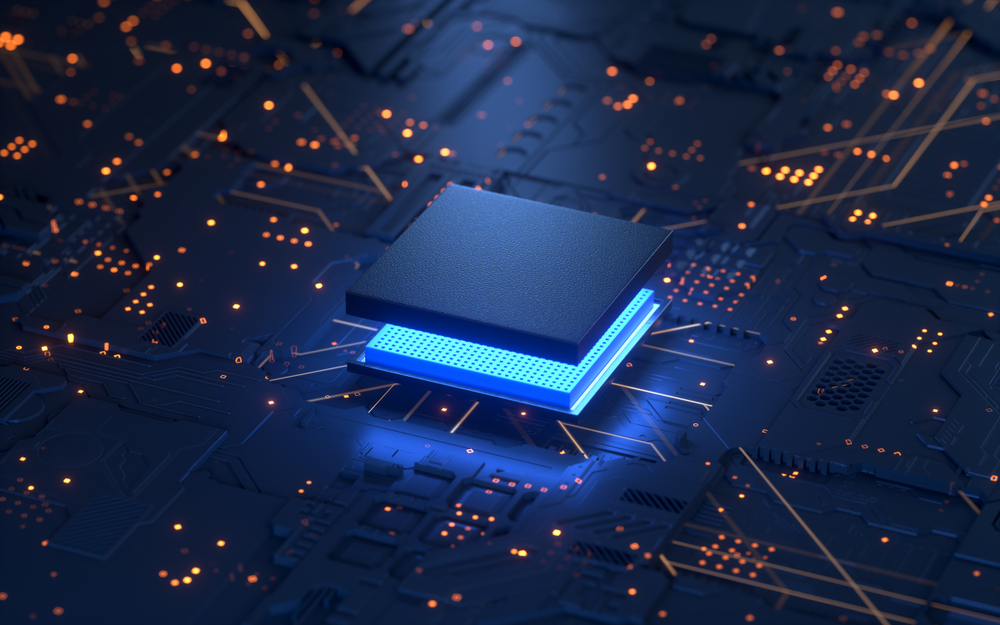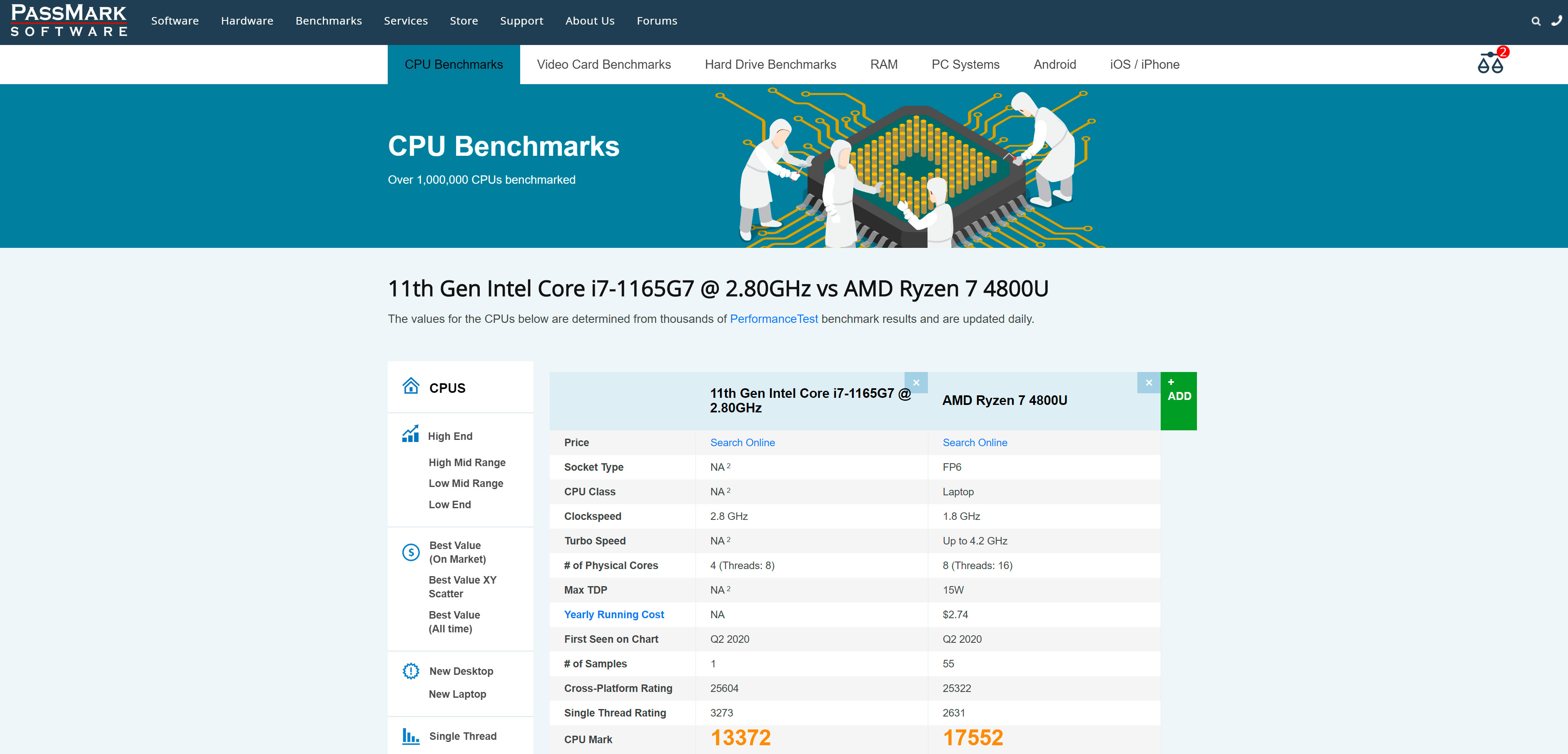Intel Tiger Lake Allegedly Beats AMD Ryzen 4000 In Single-Thread Workloads

A newly-posted series of PassMark Software results (via @TUM_APISAK) show that Intel's 11th Generation Tiger Lake chips can't hang with AMD's Ryzen 4000-series (codename Renoir) APUs in multi-threaded workloads. However, Team Blue is reportedly still the reigning champ in single-threaded performance.
The Core i7-1165G7 and the Ryzen 7 4800U are the two processors caught in today's brawl. The former is a 10nm++ processor that wields four Willow Cove cores clocked at 2.8 GHz, while the latter is a 7nm chip that flexes eight Zen 2 cores with a 1.8 GHz base clock. Regardless of what each chipmaker calls the technology, both chips come with threaded cores.
The difference in core counts and base clock speeds between the quad-core Core i7-1165G7 and octo-core Ryzen 7 4800U is abundantly clear. Before even looking at the benchmark results, it's safe to speculate that the AMD chip will excel in multi-threaded workloads.
| Processor | Cores / Threads | Base / Boost Clock (GHz) | L3 Cache (MB) | TDP (W) |
|---|---|---|---|---|
| Ryzen 7 4800U | 8 / 16 | 1.8 / 4.2 | 8 | 15 |
| Core i7-1165G7* | 4 / 8 | 2.8 / 4.7 | 12 | ? |
*Specifications are unconfirmed.
PassMark essentially averages all the results from the software's PerformanceTest submissions to calculate the final score. The Ryzen 7 4800U has been out for some time now, so PassMark is working with a sample size of 55. There's only one sample for the Core i7-1165G7, so the margin for error is very high. That means we should take the benchmark results with a grain of salt.
According to PassMark, the Core i7-1165G7's 1 GHz higher base clock propelled the chip to a single-thread score of 3,273 points. The Ryzen 7 4800U scored 2,631 points in the same test. Therefore, the Core i7-1165G7 delivered up to 24.4% higher single-core performance than the Ryzen 7 4800U.
At the end of the day, the Ryzen 7 4800U is still the superior chip of the two. For what it's worth, PassMark rates the Ryzen 7 4800U with an overall score of 17,552 points and the Core i7-1165G7 with 13,372 points. As you can tell, the octa-core processor is generally up to 31.3% better than the Core i7-1165G7, at least according to PassMark's metrics.
Get Tom's Hardware's best news and in-depth reviews, straight to your inbox.
It is normal that benchmark submissions and other leaks start to surface as we get closer to a processor launch. Like the saying goes, a win is a win, and Tiger Lake appears to have beaten Renoir in single-core performance.
Intel will hold a big virtual event on September 2. The chipmaker hasn't explicitly confirmed that it will announce Tiger Lake at the event, but the general expectation is that Intel will ultimately unleash the 10nm++ processors at the event.

Zhiye Liu is a news editor, memory reviewer, and SSD tester at Tom’s Hardware. Although he loves everything that’s hardware, he has a soft spot for CPUs, GPUs, and RAM.
-
Giroro 10nm++?Reply
So all Intel needs to do is finish getting their 10nm chips out, then release whatever-lake they are calling 10nm+, and then they can get to work on 10nm++?
Zen2 technology will probably be 2-3 years old by they time Intel can roll that out, if ever. -
Deicidium369 Reply
Tiger Lake is 10nm+ - Ice Lake was 10nm. Sapphire Rapids and Alder Lake will be 10nm++ - Ice Lake (10nm) was released last year - it's been in my Dell 13 2-in-1 since 1st week in October 2019. So roughly a year later - Tiger Lake is released (10nm+) and about a year before Alder Lake (10nm++) Sorry your info is way out of date - try again.Giroro said:10nm++?
So all Intel needs to do is finish getting their 10nm chips out, then release whatever-lake they are calling 10nm+, and then they can get to work on 10nm++?
Zen2 technology will probably be 2-3 years old by they time Intel can roll that out, if ever.
" As you can tell, the octa-core processor is generally up to 31.3% better than the Core i7-1165G7, at least according to PassMark's metrics.
twice the cores and 31% faster - must be Linux - which tracks with the Lenovo leaks for the upcoming Renoir / Tiger Lake laptops. With Windows, in that test, the 4800U was a massive 6% faster with 2x the cores. and that is the Tiger Lake U variant - so 15W - just like in the Lenovo leaks. -
gg83 Did I hear that they are back-porting 10nm architecture to 14nm? Is intell having a hard time with thermals or increased power consumption at smaller nodes?Reply -
Kamen Rider Blade So with the Single Core Performance Metric:Reply
AMD Ryzen 7 4800U @ Base/Boost = 1.8/4.2 GHz = Single Threaded Benchmark Score of 2631
Intel Core i7-1165G7 @ Base/Boost = 2.8/4.7 GHz = Single Threaded Benchmark Score of 3273
The 4.7 GHz boost is "Speculative"
Intel's TDP is unknown
L3 Cache is speculated to be 50% larger
642 = 3273-2631 ~= 24.4% faster Single Threaded
Intel's Base Clock ~= 55.555…% faster over the AMD part
Intel's Boost Clock ~= 11.905 % faster over the AMD part
So how much of this Faster Single Threaded performance do you think is due to Frequency, Cache, IPC, TDP headroom? -
SkyBill40 ReplyKamen Rider Blade said:So how much of this Faster Single Threaded performance do you think is due to Frequency, Cache, IPC, TDP headroom?
Uhh... I'd be willing to bet on nearly all of it being on frequency with the other bits bringing up the rest. A whole Ghz faster is going to inflate the numbers, especially in single core. If it had as may cores as the AMD part, I don't think it looks as good as it might sound.
Even still, I'd take the AMD part over the Intel one. -
wownwow ReplyKamen Rider Blade said:So with the Single Core Performance Metric:
AMD Ryzen 7 4800U @ Base/Boost = 1.8/4.2 GHz = Single Threaded Benchmark Score of 2631
Intel Core i7-1165G7 @ Base/Boost = 2.8/4.7 GHz = Single Threaded Benchmark Score of 3273
The 4.7 GHz boost is "Speculative"
Intel's TDP is unknown
L3 Cache is speculated to be 50% larger
642 = 3273-2631 ~= 24.4% faster Single Threaded
Intel's Base Clock ~= 55.555…% faster over the AMD part
Intel's Boost Clock ~= 11.905 % faster over the AMD part
So how much of this Faster Single Threaded performance do you think is due to Frequency, Cache, IPC, TDP headroom?
In addition, 8/16 vs. 4/8. No sure what is toms's HARDWARE's agenda of publishing this type of misleading article, Intel competitiveness fund in work? -
spongiemaster Replywownwow said:In addition, 8/16 vs. 4/8. No sure what is toms's HARDWARE's agenda of publishing this type of misleading article, Intel competitiveness fund in work?
4800U has the highest boost clock of any of their 15W parts, so it also has the highest single threaded performance of any of their 15W parts. If THG chose the quad core 4300U which only boosts to 3.7Ghz, you would be accusing them of shilling for Intel, because the 4800U boosts 500Mhz higher. Damned if you do, damned if you don't. -
spongiemaster ReplyKamen Rider Blade said:So with the Single Core Performance Metric:
AMD Ryzen 7 4800U @ Base/Boost = 1.8/4.2 GHz = Single Threaded Benchmark Score of 2631
Intel Core i7-1165G7 @ Base/Boost = 2.8/4.7 GHz = Single Threaded Benchmark Score of 3273
The 4.7 GHz boost is "Speculative"
Intel's TDP is unknown
L3 Cache is speculated to be 50% larger
642 = 3273-2631 ~= 24.4% faster Single Threaded
Intel's Base Clock ~= 55.555…% faster over the AMD part
Intel's Boost Clock ~= 11.905 % faster over the AMD part
So how much of this Faster Single Threaded performance do you think is due to Frequency, Cache, IPC, TDP headroom?
For a single threaded benchmark, these CPU's are definitely going to be boosting. Why even bother posting the base clocks unless you're intentionally trying to throw a misdirection? 12% faster clocks, 24% higher single threaded performance. Obviously the performance gain isn't purely down to clock speed advantage. The real question is what the TDP is. If it's 15W, then for most people the TL CPU will be the faster choice for a mobile option, sour grapes and all. -
MasterMadBones Reply
Technically Ice Lake is 10nm+ and Tiger Lake is 10nm++. The original 10nm is in Cannon Lake, which Intel wants us all to forget about. The difference in node performance between Cannon Lake and Ice Lake is night and day.Deicidium369 said:Tiger Lake is 10nm+ - Ice Lake was 10nm. Sapphire Rapids and Alder Lake will be 10nm++ - Ice Lake (10nm) was released last year - it's been in my Dell 13 2-in-1 since 1st week in October 2019. So roughly a year later - Tiger Lake is released (10nm+) and about a year before Alder Lake (10nm++) Sorry your info is way out of date - try again.
About 50% clock speed, 50% IPC. I don't know how Passmark responds to cache. TDP should be 15W for both in a stock configuration and generally doesn't affect single threaded performance these days. With Zen 2 having about 5-10% more IPC than Skylake, Willow Cove should be another 10% or so ahead of that.Kamen Rider Blade said:So how much of this Faster Single Threaded performance do you think is due to Frequency, Cache, IPC, TDP headroom? -
bit_user Reply
Yes. The cores do no exist in a vacuum. The more cores you have, either you must increase power and cooling or decrease clocks. AMD clearly did the latter, as this chip is still limited to 15 W.Deicidium369 said:twice the cores and 31% faster
1.8 GHz * 8 cores = 14.4 Core GHz
2.8 GHz * 4 cores = 11.2 Core GHz
That puts the Ryzen at only 28.6 % faster. So, if it reached 31%, that actually better than expected!
